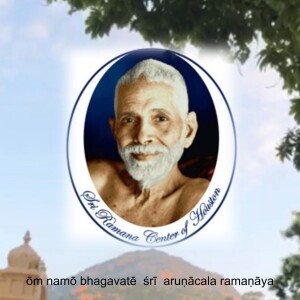
In a Zoom meeting with Ramana Kendra, Delhi, on 13th November 2022 Michael James discusses the meaning and implications of verses 29 and 30 of Upadēśa Sāraḥ:
----more----
Upadēśa Sāraḥ verse 29:
बन्ध मुक्त्यती तंप रंसुखम् ।
विन्द तीहजी वस्तु दैविकः ॥ २९ ॥
bandha muktyatī taṁpa raṁsukham
vinda tīhajī vastu daivikaḥ
पदच्छेद: बन्ध मुक्ति अतीतम् परम् सुखम् विन्दति इह जीवः तु दैविकः.
Padacchēda (word-separation): bandha mukti atītam param sukham vindati iha jīvaḥ tu daivikaḥ.
English translation: The divine soul certainly experiences here supreme happiness, which transcends bondage and liberation.
Explanatory paraphrase: The divine soul [the soul that has seen itself without adjuncts, thereby remaining as its real nature, which is the real nature of God] certainly experiences here [and now] supreme [or ultimate] happiness, which transcends [or is beyond] bondage and liberation.
Upadēśa Sāraḥ verse 30:
अहम पेतकं निजवि भानकम् ।
महदि दंतपो रमण वागियम् ॥ ३० ॥
ahama pētakaṁ nijavi bhānakam
mahadi daṁtapō ramaṇa vāgiyam
पदच्छेद: अहम् अपेतकम् निज विभानकम् महत् इदम् तपः. रमण वाक् इयम्.
Padacchēda (word-separation): aham apētakam nija vibhānakam mahat idam tapaḥ. ramaṇa vāk iyam.
English translation: One’s own shining devoid of ‘I’, this is great tapas. This is Ramana’s saying.
Explanatory paraphrase: One’s own shining [or shining as one’s own real nature] devoid of ‘I’ [ego], this is great tapas. This is [Bhagavan] Ramana’s saying.
This episode can also be watched as a video, 2022-11-13 Ramana Kendra, Delhi: Michael discusses Upadēśa Sāraḥ verses 29 and 30, and a more compressed audio copy in Opus format (which can be listened to in the VLC media player and some other apps) can be downloaded from here.
More Episodes
 2022-01-05
2022-01-05
 209
209
 2022-01-04
2022-01-04
 214
214
 2022-01-01
2022-01-01
 185
185
 2021-12-27
2021-12-27
 200
200
 2021-12-22
2021-12-22
 208
208
 2021-12-21
2021-12-21
 189
189
 2021-12-15
2021-12-15
 169
169
 2021-12-15
2021-12-15
 159
159
 2021-12-13
2021-12-13
 155
155
 2021-12-10
2021-12-10
 163
163
 2021-12-08
2021-12-08
 119
119
 2021-12-02
2021-12-02
 160
160
 2021-12-02
2021-12-02
 124
124
 2021-11-23
2021-11-23
 161
161
 2021-11-21
2021-11-21
 177
177
 2021-11-20
2021-11-20
 168
168
 2021-11-20
2021-11-20
 158
158
 2021-11-20
2021-11-20
 115
115
Create your
podcast in
minutes
- Full-featured podcast site
- Unlimited storage and bandwidth
- Comprehensive podcast stats
- Distribute to Apple Podcasts, Spotify, and more
- Make money with your podcast
It is Free
- Privacy Policy
- Cookie Policy
- Terms of Use
- Consent Preferences
- Copyright © 2015-2024 Podbean.com





